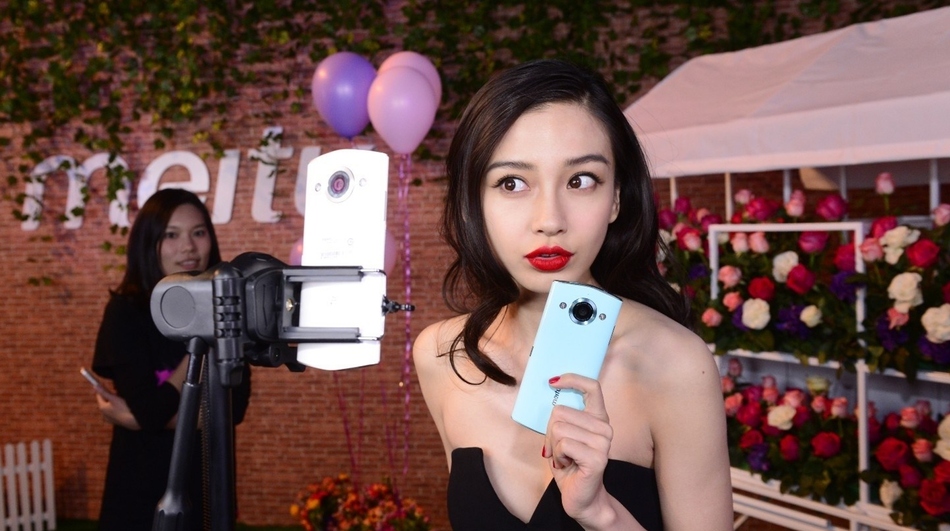The phenomenon of the selfies apps in China is already successful, but applications to magnify pictures like Meitu Pic (or “Meitu Xiu Xiu in Chinese) are boosting its use. When Wang, a young Chinese, learned that Europeans rarely photoshop their selfies before posting them on social networks, he was stunned. “What a chance! I can’t bear the retouched pictures of girls. I wish I could see them as they are for real.” Unfortunately for Wang, this is not the trend among young Chinese females today. On the contrary, apps that enable to beautify selfies are booming. It is, in particular, the case of Meitu, whose name in chinese means beautiful (“mei”) picture (“tu”).
Selfies apps in China: Meitu Pic, China’s number one selfie app
Downloaded more than a billion times since its creation in 2008, Meitu Pic, one among the 18 composing Meitu’s universe, is used by some 52 million people daily. Meitu Pic is undoubtedly the most popular tool to beautify selfies in China. Used by 70% of women, the app enables, for instance, thanks to programs of facial recognition and 3D modelisation, to lighten the skin, sharpen the chin, reduce the volume of the cheeks, change the eye color or even slightly broaden the eyes in order to transform its young users into Asian beauty canons. Meitu Pic first took off in China, but the success quickly expanded abroad as the app was made available in other languages, thanks to its filters that automatically magnify a portrait without having to modify it manually, or brighten the skin tone with the result that is more or less natural, depending on the desired effect.
The success of Meitu is such that it disrupted the selfies apps in China. According to an article from Le Figaro, almost 900 million smartphones hold at least one of Meitu’s apps, among which BeautyCam, BeautyPlus, Pomelo, and SmoothPlus, that offer similar features. Chinese people were already keen on those self-portraits were taken with one click of their smartphone. But the possibility to modify those pictures expanded the phenomenon of selfie far further among young generations (15 to 30 years old). In April 2016, the application nicknamed “the godly tool for selfies” has 270 million active users and the company hopes to reach five million downloads this year (interview of its CEO Mike Cai by Bloomberg).
The Chinese leader of selfie apps is preparing to go public by the end of 2016
Investors quickly noticed the rapid growth of Meitu and its potential regarding revenues. The company is currently valorised at 3.8 billion dollars after a fundraising led by Keywise Capital Management from Hong Kong. The investment fund joins the Taiwanese Foxconn Technology Group, the American Tiger Global Management, as well as IDG Capital Partners and Qiming Venture Partners.
But Meitu has even more ambitious plans. The company may list on the Hong Kong stock exchange in the fourth quarter of 2016 with the goal of raising up to one billion dollars, the Wall Street Journal reports (source: Wall Street Journal). Going public could valorise Meitu at five billion dollars.
The app Meitu Pic does not yet enable the Chinese company to make profit
Despite this enthusiasm, some investors are still skeptic regarding Meitu’s business model. Indeed, the company whose core business is to conceive smartphones for Android does not make profits thanks to its applications yet. For now on, the app generates income via in-app advertising and some premium services. But this is not enough. Possible solutions to generate income lay in better integrating brands to the service and include online shopping functionalities.
However, other selfie apps have been able to valorise advertising on their interface. One of them is POCO Camera, a very popular app launched by Poco.cn three years ago for American-Asians. It proposed to the brand Guerlain to promote its Meteoric Powder to reproduce the virtual skin-lightening effect of the app on the cheeks of its users; (source: Jing Daily). The French perfume maker was also able to mobilize young Chinese females by launching a beauty competition to which 41,000 people participated.
Selfies apps in China: Competition from cameras designed to make selfies
What’s more, Meitu is not the only actor of the selfie apps in China: Chinese people are also using free rival applications such as FaceU, PicsPlay, SelfieCity or Camera360 as well as more and more foreign products among which Instasize, VSCO or the Japanese app B612. Apart from similar apps, the Chinese company must face new competitive products: cameras that automatically beautify pictures, thus avoiding their users to modify manually each portrait. The innovation comes from Casio, which already launched two models of beautifying cameras (sery Exilim TR).
This camera could represent an even more serious competitor for Meitu given that Casio already generates income on this product: the initial price of the Exilim was 249 dollars, but it was multiplied by four in six months, reaching 1000 dollars as the result of a soaring demand. However, this represents four times the average Chinese net income; (source: Quartz notices), and those who can’t afford the camera may keep using Meitu. This gives time to the application to strengthen its model and its market shares on the giant Chinese selfie market.
See also our service: Market Potential China
Stay Updated! Follow us on Twitter:
Luxury industry in #China: What can #luxury #brands do to capture Chinese consumers’ interest? https://t.co/DmZzoaGMEw
— Daxue Consulting (@DaxueConsulting) October 24, 2016





